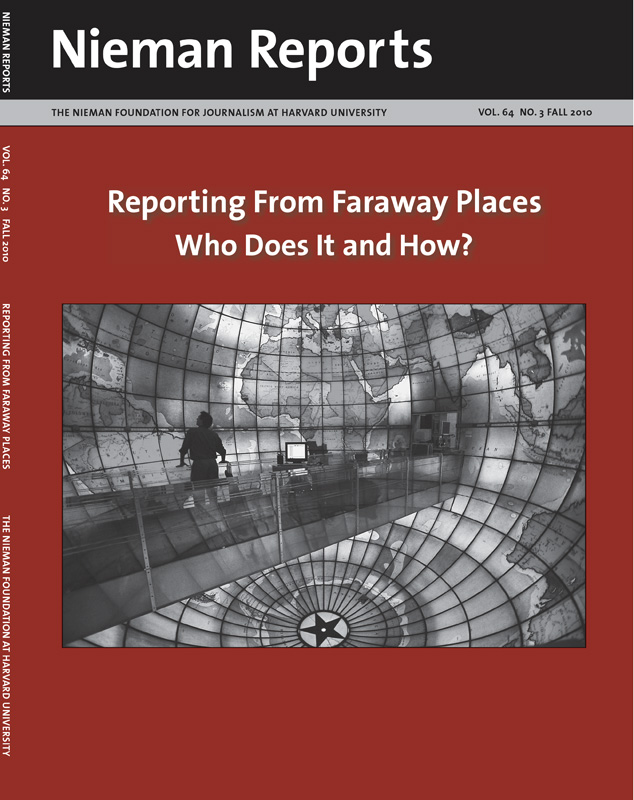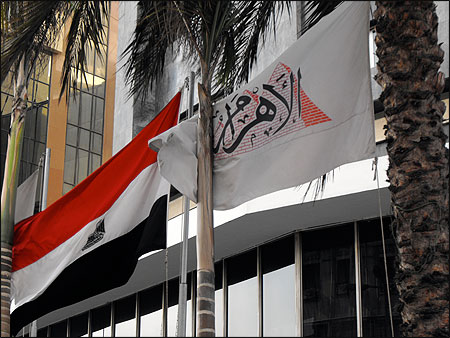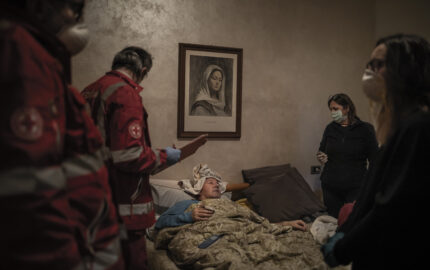

Despite having the necessary permit, Ian Lee was told by a plainclothes policeman outside the Cairo headquarters of the government-owned Al-Ahram newspaper to stop taking pictures—even of these flags. Photo by Ian Lee.
Arab news organizations largely report visible events, rather than uncover news about what isn’t. Investigative journalism has never taken off in the Arab world as it has in the West. To put it mildly, government officials in this region don’t look favorably on the idea, not that their counterparts in Western democracies always appreciate the stories watchdog reporters produce. But in Arab countries journalists face a barbed maze fraught with intimidation, demotion, incarceration and sometimes even death.
The most common way that Arab governments stifle investigative reporting is by applying financial pressure. Arab states are intimately involved in the economic well-being of many Arab news organizations so they apply pressure in several ways, most notably through ownership or advertising. In return, they get homage. Perhaps the best-known example is Al-Jazeera, funded by the Qatari royal family and which broadcasts nary a report critical of Qatar’s government. But there are others. Egypt’s Al-Ahram newspaper, the country’s largest in circulation, is owned by President Hosni Mubarak’s regime and is dutifully pro-government. Jordan’s largest circulation daily, Al-Rai, is also partly owned by the ruling government, and its devotion to the monarchy is similarly clear.
Some Arab governments also heavily subsidize or buy advertising in privately owned news outlets which, should they publish something the government finds unseemly, could suddenly find themselves without one of their largest clients. Most major newspapers in the United Arab Emirates, for example, if not owned outright by the regime, receive heavy government subsidies.
The result of this patronage isn’t surprising. To put a contemporary twist on what George Bernard Shaw observed: A government that pays Peter to write about Paul will always be pleased with coverage of Paul.
So from my perch as a journalism professor in Cairo, I have wondered whether as nonprofit investigative journalism becomes more prevalent in the West, donation-driven journalism might create and sustain a more independent and investigative press in Arab countries. Could nonprofit journalism organizations in the United States, such as the longstanding Center for Public Integrity (CPI) and the more recently founded ProPublica, serve as inspiration for investments in the Arab world that would promote investigative reporting? After all, these two nonprofits, along with several even newer ones with similar missions and funding streams (a mix of foundations and individual donors), have given investigative reporting a significant boost at a time when many cash-strapped news organizations aren’t able to support it as they once did. ProPublica won a Pulitzer Prize this year for its coverage of the life-and-death decisions of exhausted doctors at a Katrina-battered hospital in New Orleans.
Throughout the Arab world, nongovernmental organizations (NGOs) fund efforts to promote economic development. Why not create a ProPublica-like news organization here to give the public more watchdog journalism?
An Arab Nonprofit Center
Here’s what I envision. Financially, a nonprofit center for investigative journalism would be set up in ways similar to CPI and funded by foundations and individuals. An initial grant to fund this organization would come from a place like the John S. and James L. Knight Foundation or the Carnegie Corporation with the hope of generating long-term support from other groups and individuals. (It wouldn’t work to have money from either a government agency or labor union as part of the mix.) Once the center starts to publish investigative reports that Arab citizens find useful, then more funding would find its way to supporting this effort. There is no shortage of Arabs who, in despair over the lack of government accountability, might give to a nonprofit center that has demonstrated the demand for more of it.
Other than financial leverage, one way that Arab governments control the press is through licensing requirements. Many Arab journalists must obtain government permits to work and can lose their credentials if they get too pushy. In Egypt, for example, journalists shooting video footage must get a series of government permits, which, once obtained, often don’t stop the regime from physically blocking newsgathering. And in Iraq, the government is also trying to impose licensing on journalists. Such a center, then, would probably have to be based initially in Lebanon, an Arab country where journalists have relatively more freedom and whose government doesn’t impose a draconian licensing system.
The center would be staffed with Arab and non-Arab reporters and editors. It would likely be necessary to have a few reporters of other nationalities working there, too, such as Iranians and Turks, to cover some regional issues. All publications would be made available free online in both Arabic and English, with occasional reports in French and Persian. The center would also need reporters with Arab-American or Arab-European dual nationality to file reports from Israel and the Palestinian territories, to which many Arabs cannot travel.
In the words of anti-corruption group Transparency International, this center would devote itself to investigating the “abuse of entrusted power,” whether in government or in political, religious or financial institutions. Such reporting could involve the monitoring of presidential elections in Egypt, following the trail of foreign aid in Jordan, and screening the activity of banks in Lebanon.
Of course, even an investigative journalism center based in a country such as Lebanon or Jordan would face government limitations. These countries have at times either imprisoned journalists or imposed punitive fines on them, and if reporting duties took them into other countries, they’d confront an even harsher climate of resistance. Still, an internationally funded journalism center would be hard for these governments to contain. As a way to buttress their work—and perhaps create greater protection against government intrusion—these journalists could team up with global news outlets like The New York Times and Reuters on joint reporting projects, just as ProPublica has done with print and broadcast news organizations.
Investigative journalism does exist, to some extent, in Arab countries. The independently owned Al-Ghad newspaper in Jordan, for example, takes its watchdog role seriously, and opposition papers in countries such as Lebanon and Egypt routinely push boundaries. Also, Arab bloggers reveal scandals while citizen journalists have used mobile cameras and social media to bring videos of official torture in Egypt and other countries to digital outlets such as YouTube.
But sporadic investigative reporting in this autocratic region isn’t enough. There need to be independent news organizations in the Arab world with the sole mission of monitoring and making known abuses of power. Right now power in the Arab world resides mostly in the governments and their intelligence services, not with the people or the press. It doesn’t have to be this way.
Justin D. Martin teaches in the Department of Journalism and Mass Communication at the American University in Cairo. He tweets @Justin_D_Martin and can be reached at martin@aucegypt.edu.


